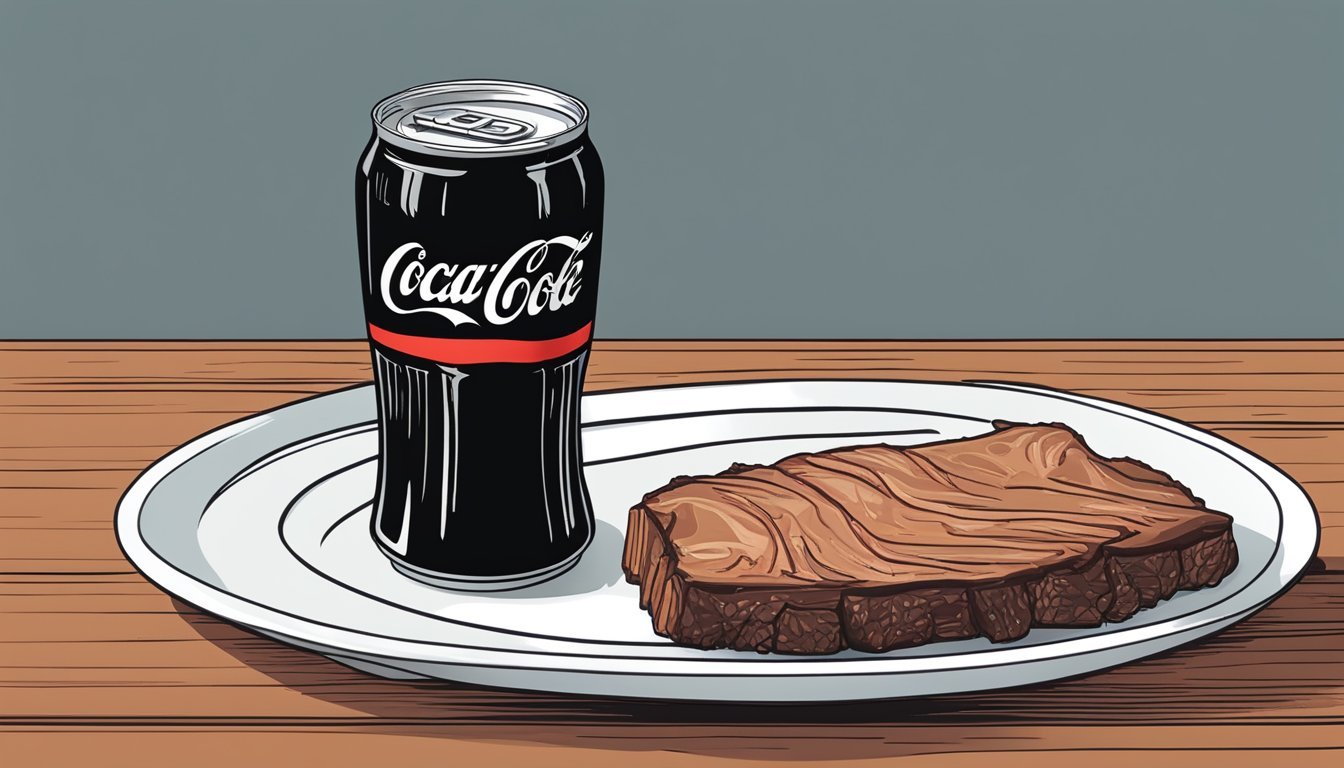Coke Zero on Carnivore Diet
Balancing Cravings and Nutrition
The carnivore diet typically incorporates only animal products and excludes all other food groups, emphatically focusing on meats and excluding carbohydrates, sugars, and artificial ingredients. Individuals who adopt this dietary regime do so seeking various health benefits, such as reduced inflammation, improved mental clarity, and weight management. Adherents often have to make significant adjustments to their diet, which includes reconsidering their beverage choices.
Within the carnivore community, there is a debate about the inclusion of zero-calorie soft drinks like Coke Zero. These beverages, despite being devoid of calories and sugars, contain artificial sweeteners and additives such as aspartame and caramel color. The introduction of artificial ingredients is incongruent with the carnivore diet's principle of consuming only natural, animal-derived products.
Considering overall health and well-being, many suggest that such drinks, even though calorie-free, may not align well with the objectives of the carnivore diet. Detractors argue that apart from deviating from a strictly animal-based diet, artificial sweeteners may potentially trigger cravings and other unwanted physiological responses. It's essential for individuals following or considering the carnivore diet to scrutinize the compatibility of diet sodas within this eating plan.
Understanding the Carnivore Diet
The carnivore diet is a regimen that thrives on animal products and excludes plant-derived foods. It's designed to align with the belief that humans are optimized for a meat-centric diet.
Core Principles of the Carnivore Diet
The carnivore diet holds that animal products should constitute the entirety of one's nutrition. This means a diet rich in protein and fats, as well as other nutrients like certain vitamins and minerals naturally found in animal foods.
Animal Products Only: Meat, fish, eggs, and certain dairy products.
Zero Carbohydrates: Virtually no intake of plant-based food items.
High-Protein: Emphasis on meat as the primary source of protein.
Those who follow this diet often aim for a state of ketosis, where the body burns fat for energy in the absence of carbohydrates.
Potential Health Impacts
The health implications of the carnivore diet can vary. Proponents suggest that this diet can lead to improvements in energy levels, mood, and various clinical markers of health. Opponents, however, caution against the potential risks such as nutrient deficiencies or increased heart disease risk due to high saturated fat intake.
Positive: Claims of improved digestive health and reduced inflammatory responses.
Negative: Concerns over limited intake of fiber and certain vitamins.
Role of Beverages on the Carnivore Diet
Hydration is critical on any diet, and the carnivore diet is no exception. The focus here is on beverages that either come from animal sources or do not contradict the diet's core principles.
Preferred Beverages:
Water: Essential for life and hydration.
Bone Broth: Nutritious, animal-sourced, and rich in minerals.
Milk (for some individuals): Provides protein, fat, and calcium.
Beverages like diet sodas are typically excluded due to their non-animal origin and the presence of artificial additives. The carnivore diet promotes a return to fundamental, unprocessed sources of nutrition and hydration.
Coke Zero Overview
Coke Zero, marketed as Coca-Cola Zero Sugar, is positioned as a low-calorie, sugar-free alternative to traditional soda.
Nutritional Profile
Coke Zero stands out in the sugar-free soda market by providing a drink that contains zero calories and zero sugar. The nutritional profile of Coke Zero is as follows:
Calories: 0
Total Fats: 0g
Sodium: 40 mg
Total Carbohydrates: 0g
Dietary Fiber: 0g
Total Sugars: 0g
Protein: 0g
Caffeine: Approx. 34mg
The primary ingredients include carbonated water, caramel color, phosphoric acid, aspartame, potassium benzoate, natural flavors, and potassium citrate.
Comparison to Diet Coke and Traditional Soda
Comparatively, Coke Zero is often likened to Diet Coke, another popular sugar-free variant of traditional Coca-Cola. While both contain zero calories and zero sugar, their flavor profiles differ as a result of distinct formulas and sweeteners used. Diet Coke contains approximately 12 mg more caffeine than Coke Zero.
In contrast to traditional soda, which contains high levels of sugar and calories, both Coke Zero and Diet Coke offer alternatives to those seeking the Coca-Cola flavor without the associated caloric intake from sugars. Traditional sodas, for instance, typically contain:
Calories: 140 or more per 12 oz
Total Sugars: 39g or more per 12 oz
Water, as a beverage option on the carnivore diet, remains the most neutral and natural choice, devoid of artificial sweeteners, colorings, or preservatives, lending it to be the most straightforward hydrating solution.
Analyzing Ingredients in Coke Zero
Coke Zero is designed to mimic the classic Coca-Cola flavor without the sugar content, relying on a combination of artificial sweeteners, caffeine, and preservatives to achieve its distinct taste and lasting shelf life.
Artificial Sweeteners
Coke Zero utilizes aspartame and acesulfame potassium as its primary artificial sweeteners. Aspartame is known for its sweetness, which is about 200 times stronger than that of regular sugar. It has zero calories, contributing to the diet-friendly profile of the beverage. However, aspartame breaks down into phenylalanine, a component that individuals with phenylketonuria (PKU) should avoid. Acesulfame potassium, another calorie-free sweetener, is often combined with aspartame to provide a more sugar-like taste.
Caffeine Content
Each 12-ounce can of Coke Zero contains approximately 34 milligrams of caffeine. Caffeine is a natural stimulant that can briefly prevent drowsiness and restore alertness. Despite its lower caffeine content compared to Diet Coke, sensitive individuals may still want to moderate their intake to manage potential caffeine-related health issues.
Additives and Preservatives
Aside from sweeteners and caffeine, Coke Zero includes several additives and preservatives. The brand incorporates caramel color to achieve its distinctive look. Phosphoric acid and citric acid are added to provide tanginess and acidity, while potassium benzoate is used as a preservative to protect taste and prevent spoilage. The label also lists natural flavors, which are proprietary to Coca-Cola and contribute to the beverage's signature taste.
Potential Health Concerns
When considering Coke Zero in the context of a carnivore diet, it is important to assess how its ingredients might interact with metabolism, neurological health, and how they are regulated.
Metabolic Health
Coke Zero boasts zero calories and sugars, yet questions remain about its impact on metabolic health. Aspartame, an artificial sweetener in Coke Zero, has been linked to potential disturbances in metabolism. Despite having no calories, aspartame can potentially trigger a cephalic phase insulin release, which may disrupt normal metabolic processes and signals of satiety. This phenomenon may conflict with the goals of a carnivore diet, which typically aims to optimize metabolic health and steer clear of foods that can lead to weight gain or obesity.
Neurological Aspects
The caffeine content in Coke Zero is a consideration for neurological health. While low to moderate caffeine consumption has recognized benefits such as increased alertness, higher intakes can be associated with health concerns such as increased risk of anxiety, depression, and even long-term risks of dementia. The research into aspartame has generated controversy, with some studies suggesting a neurotoxic potential that could lead to inflammation or neurological degradation if consumed in high quantities.
Regulatory Viewpoints
Regulatory bodies, such as the FDA (Food and Drug Administration), have deemed components of Coke Zero such as aspartame and caffeine to be generally recognized as safe when consumed within the acceptable daily intake levels. Despite this, they continue to monitor scientific studies and public reports relating to the long-term health effects. The term "generally recognized as safe" does not preclude potential health concerns from excessive consumption but provides a guideline for moderate, non-toxic consumption levels.
Interactions with Diet and Nutrition
The consumption of Coke Zero, a zero-calorie drink, impacts diet and nutrition in several ways due to its content and the body's response to artificial sweeteners. This section examines the influence of Coke Zero on weight management and insulin, its place in low-carb and ketogenic diets, and its effects on food cravings and the palatability of diets.
Influence on Weight and Insulin
Coke Zero, being a low-calorie beverage, does not directly contribute to weight gain due to an absence of calories. However, its effects on insulin levels are not straightforward. While it does not contain sugars that raise blood glucose levels, the presence of artificial sweeteners like aspartame can lead to an insulin response. The release of insulin could potentially affect weight management and complicate insulin control for those on a strict diet.
Compatibility with Low-Carb and Ketogenic Diets
Given that Coke Zero is marketed as having zero carbs, it fits within the guidelines of low-carb and ketogenic diets. These diets typically restrict carbohydrate intake to promote a state of ketosis, where fat is utilized for energy instead of glucose. The absence of carbs in Coke Zero means it does not disrupt this metabolic state, making it a drink option for those following these protein-rich nutrition plans.
Food Cravings and Palatability
The taste of Coke Zero, which mimics that of regular cola without the calories, may influence food cravings. Some individuals find that the sweet aftertaste of artificial sweeteners can enhance cravings for sweet foods, potentially leading to increased caloric intake from other sources. This can be particularly challenging for those attempting to adhere to a carnivore diet, which eliminates carb-rich foods. In terms of palatability, incorporating Coke Zero can provide variety and improve a diet's appeal, which may benefit overall well-being and diet adherence without adding nutritional value.
Lifestyle and Dietary Considerations
When adopting a carnivore diet, individuals prioritize animal products and typically exclude other food groups, including sugar-sweetened beverages. This section examines how Coke Zero aligns with a carnivore lifestyle and explores beverage alternatives.
Incorporating Coke Zero into a Carnivore Diet
While Coke Zero is free from sugar and calories, it contains artificial sweeteners and preservatives, which are not in harmony with the carnivore diet's emphasis on natural animal products. Coke Zero:
Artificial Sweeteners: May include aspartame, which is not a natural animal product.
Carnivore Diet Compatibility: The diet advocates for the consumption of only animal-sourced nutrients, and Coke Zero lacks these nutrients.
Hydration: Although crucial, hydration on a carnivore diet typically comes from consuming water, milk, or bone broth, rather than artificially sweetened beverages.
Alternatives to Soda on the Carnivore Diet
When considering hydration options, those following the carnivore diet have several other beverages that align more closely with its principles.
Suggested Alternatives:
Water: Essential for life and the most natural form of hydration.
Bone Broth: Rich in nutrients extracted from animal bones, also supports hydration.
Milk: Provides hydration and is a source of animal-based nutrients.
Coffee and Green Tea: These can be included in moderation; however, plain without additives aligns best with the diet.
In summary, these options are preferable for maintaining proper hydration and adhering to the carnivore diet's focus on natural, animal-sourced nutrients without the addition of artificial components found in beverages like Coke Zero.
Expert Opinions and Research
The discussion surrounding the inclusion of Coke Zero in a carnivore diet principally centers on its ingredients and their effects on health, as informed by expert opinions and clinical research findings.
Registered Dietitian Insights
Registered dietitians have raised concerns about the consumption of Coke Zero on a carnivore diet due to the presence of artificial sweeteners like aspartame, which can affect metabolic responses despite the lack of calories. This artificial sweetener is a combination of aspartic acid and phenylalanine, and is FDA-approved for consumption, provided it is within the acceptable daily intake (ADI). However, for individuals with phenylketonuria (PKU), a rare genetic disorder, consumption of phenylalanine must be strictly monitored, as they cannot metabolize it properly.
Recent Studies and Clinical Trials
Recent studies and clinical trials continue to explore the effects of food additives like those found in Coke Zero on overall health. In regards to the carnivore diet, the absence of carbohydrates means that the metabolism can be highly sensitive to additives that can simulate a glycemic response. The World Health Organization and other health entities monitor the long-term effects of these additives, including components like methanol that could be a metabolic byproduct, and continue to update guidelines and recommendations to ensure consumer safety.
Coke Zero in Popular Culture and Media
Coke Zero has become an emblematic presence in contemporary culture, driven by consumer demand for sugar-free options and Coke’s aggressive marketing campaigns. This section explores how Coke Zero aligns with modern trends and how it is perceived through its branding efforts.
Consumer Trends and Preferences
Consumers have shown an increasing propensity towards drinks with reduced sugar content, primarily due to health concerns associated with high sugar intake. Coke Zero, which markets itself as a zero sugar soft drink, capitalizes on this trend by offering the familiar taste of Coca-Cola without the sugar. This aligns with consumers' desires for both taste and health-conscious options.
Preferences:
Taste similar to regular Coca-Cola: Key factor for the drink's popularity.
Zero sugar content: Appeals to those reducing sugar for health or dietary reasons.
Marketing and Brand Perception
The marketing strategy of Coke Zero emphasizes its no sugar attribute while retaining the core Coca-Cola flavor. The brand perception of Coke Zero is that of a modern and health-conscious soft drink option, differentiating it from other diet sodas through a focus on masculinity and adventure in its advertisements.
Key Marketing Strategies:
Tailored campaigns: Associating the drink with sports, high-energy activities, and a bold lifestyle.
Positioning: Distinguishes from Diet Coke by targeting a broader demographic inclusive of those who typically prefer the regular Coca-Cola.
Coke Zero's presence in the media and popular culture reflects a blend of consumer's preferences for healthier beverages and the company's effort to maintain its iconic status within the soft drink industry.
Final Thoughts on Coke Zero and Carnivore Diet
When examining the compatibility of Coke Zero with the carnivore diet, a few key points emerge. One must remember that the cornerstone of the carnivore diet is the consumption of animal products exclusively—valuing nutrition density and minimizing intake of non-animal-based substances.
Nutrition: Coke Zero, though devoid of calories, lacks any nutritional benefits. It doesn't contribute to the nutrient density that the carnivore diet adherents seek.
Ingredients: The presence of artificial sweeteners like aspartame in Coke Zero raises concerns. Such additives may cause unwarranted effects on gut health and could potentially interfere with the benefits of a strict carnivore regimen.
Health Impact: Proponents of the carnivore diet, including figures like Dr. Shawn Baker, emphasize on whole, nutritionally rich animal products, suggesting any deviation may not support the health goals associated with this dietary approach.
Taste and Cravings: While taste is subjective, it's argued that the consumption of sweetened beverages may perpetuate a taste for sweetness, leading to cravings that are typically avoided on a carnivore diet.
Considerations for Artificial Sweeteners on a Carnivore Diet
Nutritional Value
Detail: None
Ingredients
Detail: Contains artificial sweeteners and preservatives
Health Impact
Detail: Potentially contradictory to carnivore diet goals
Taste & Cravings
Detail: May perpetuate unwanted sweetness cravings
In conclusion, although Coke Zero might be appealing for those seeking a zero-calorie drink, its inclusion seems incongruent with the strict nutritional and health principles of the carnivore diet. Individuals following this diet typically avoid such products to maintain its integrity and potential health benefits.







